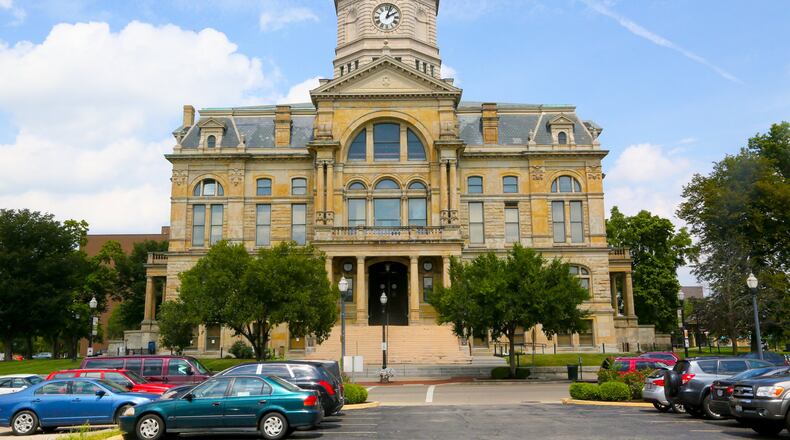Rogers said the study will likely take a couple months but this is excellent progress.
“It’s a beginning and starting this way it’s more likely you’ll end up finishing the project,” Rogers said. “What we’ve done in the past has been piecemeal, this is setting something in order and laying the foundation and developing a plan around it.”
The plan developed some urgency recently when pieces of the building started popping off.
RELATED: Butler County eyes more renovations for 131-year-old courthouse in Hamilton
There has not been a comprehensive needs assessment on the building and cost estimates are old. Several years ago Rogers said overall it would cost almost $1 million to make necessary courthouse repairs. The estimate for installing new steps all around the building was about $200,000. Shoring up the flaking sandstone facade was another $200,000, and the price for a new roof was about $500,000. Rogers said he doesn’t know how valid those prices are today.
Several years ago officials estimated it could cost $10 million to fully restore the 131-year-old iconic structure inside and out.
The county spent $91,994 five years ago to rip out and replace the major staircase on the High Street side of the building. The county didn’t have the money needed to replace the crumbling steps all around the building at that time.
The largest single capital outlay the commissioners have approved was $585,777 for sheriff’s office vehicle and equipment replacement in March. All tolled the commissioners have approved about $1 million in capital improvements this year, according to County Administrator Judi Boyko.
She said when she arrived in the county a year ago she found a “robust” capital improvement plan (CIP) didn’t exist so she polled all the commissioners departments and other offices to determine the needs. She received almost $8 million in requests. The commissioners never formally approved the $2.2 million in its entirety.
Butler County Development Director David Fehr received the largest allotment of the latest CIP approvals, which gives him $195,000 to put toward a $274,900 obsolete software upgrade for the building and zoning department and several other departments. The price has jumped from the two-year-old estimate of $259,407 but Fehr said the increase was expected.
He said he “about fell out of my chair” when he saw the initial price, but noted the upgrade will make it much easier for people to do business with the county. The office has online access now but it isn’t user friendly.
“This will actually be its own app and it will be for just your projects and you’ll get text alerts, you’ll be able to schedule inspections, you’ll see results of inspections,” he said. “So I think it’ll be a nice feature and you can do business with us when our offices are closed.”
Also approved was $188,368 for IT, including system upgrades “in preparation for Microsoft Office no longer servicing devices not equipped with Office 10, and in the interest of minimizing security threats because of non-serviced operating systems,” according to Boyko.
Items not yet approved for funding total almost $1.2 million for things like fixing the often broken escalators and elevators at the Government Services Center and Administration Building and partially automating what the commissioners have dubbed the “Stone Age” parking garage.
Boyko said the coronavirus has sidelined the CIP to some degree, because of hefty general fund revenue losses she has projected.
“Whether the commissioners decide to earmark that fully, in light of revenue reductions, and or just being able to timely address capital projects because of addressing COVID demands and needs, has not yet been determined,” Boyko said.
Untouched by budget cuts requested in the wake of the pandemic is the plan to completely erase general fund debt by year’s end. Once the $9 million annual debt payments cease the commissioners will have more money to attack the CIP and investing in economic development projects countywide.
About the Author
